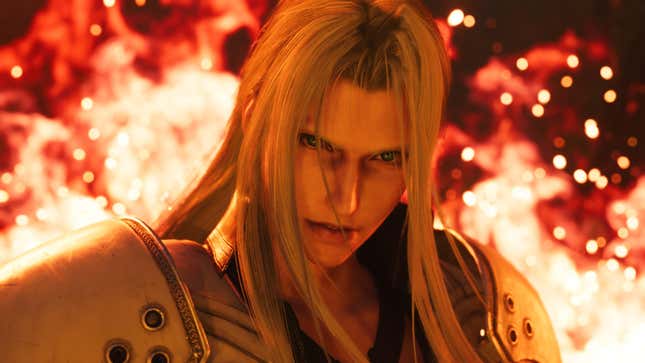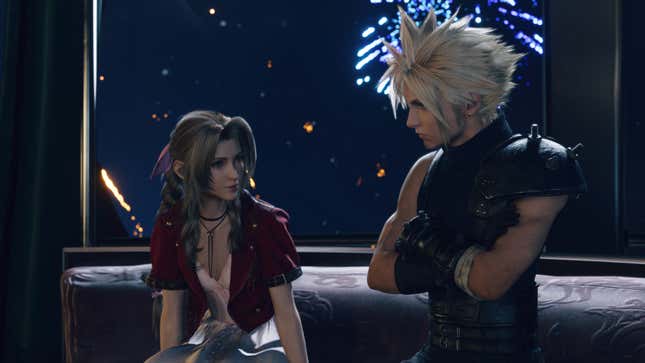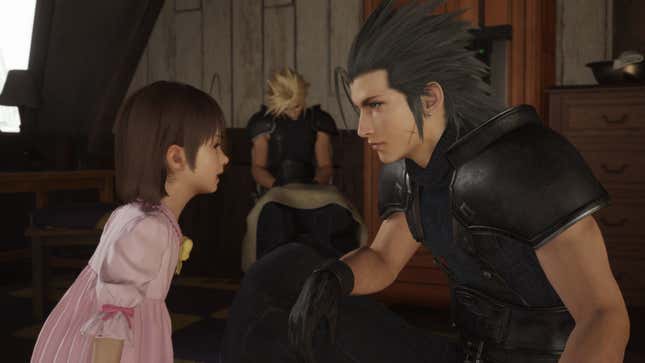
Final Fantasy VII Rebirth seems poised to dive Buster Sword-first right into stories about the multiverse. And rather than chasing tired trends like the Marvel Cinematic Universe, Square Enix’s three-game retelling of FF7 may come closer to one of the most influential comic storylines of the last century: Crisis on Infinite Earths.
This DC Comics storyline from the mid-’80s takes place after a multiversal catastrophe led to infinite realities fusing together into a single universe. Countless superheroes died, and when the dust settled, there was only one Earth left. There have been plenty of hints since Final Fantasy VII Remake that this retelling of FF7 seems to exists in a parallel or rebooted universe. Will those universes merge by the end of the third game?
There’s a suspicious line from September’s FF7 Rebirth release date reveal trailer that still sticks in my craw: “It’s upon us: the Reunion — when worlds merge,” Sephiroth says. This suggests he wants to do more than reunite Jenova—he wants to unite and dominate multiple worlds. So let’s dive a little deeper into how that could play out.

The Reunion theory
The Reunion is a haunting motif in FF7’s story, but it has nothing to do with worlds merging. Eearly in the Midgar section, foreboding figures in dark hoods murmur about a “Reunion.” We eventually learn that Professor Hojo experimented on these people with Jenova cells to make supersoldiers.
“You see, even if Jenova’s body is dismembered, it will eventually become one again,” Hojo explains. “That’s what is meant by Jenova’s Reunion.”
Often referred to as a “calamity from the skies,” Jenova is a horrific shapeshifting alien with some kind of psychic connection that functions at the cellular level. Sephiroth was injected with Jenova cells in utero and got all sorts of superpowers, but it was a trip into the Lifestream that gave him functional immortality.
Sephiroth was rumored to have died in the Nibelheim incident five years prior to the game. In reality, he was flung down a Mako Reactor shaft. Rather than get absorbed by the Lifestream like a normal person would, he seized control of Jenova’s weird biological network and coalesced a physical form in a cocoon at the Northern Crater. (If you were foggy on that order of events, don’t worry. It wasn’t particularly obvious in the days before wiki sites.)
Meanwhile, most of Hojo’s other test subjects were rendered catatonic and labeled “failed Sephiroth clones” or “shadows of the man.” Yet they still have Jenova inside them. This is the real source of Sephiroth’s power, because he can exert his will across every piece of Jenova and preserve his consciousness in the Lifestream. More often than not, the Sephiroth we see throughout the original FF7 is just a chunk of alien flesh he transforms into his shape.
Even when Sephiroth’s manifestation at the Northern Crater is eventually defeated, he does not cease to exist. His consciousness persists, creating the Geostigma disease in the animated sequel Advent Children that infects people with little bits of Jenova. He also conjures Remnants of himself, and one of them fuses with Jenova’s head to resurrect his bodily form for yet another fight against Cloud.
“I will…never be a memory,” Sephiroth taunts when Cloud kills him yet again.
The Lifestream contains all the memories, emotions, and knowledge of every person who ever lived, and the rules around its relationship with time are murky at best. In any case, Sephiroth can perceive all of this and still control traces of Jenova in the failed clones, which include Cloud — and possibly Zack Fair.

When worlds collide
In a July 2021 interview with The Gamer, Remake and Rebirth co-director Motomu Toriyama said, “Remake is based on the original, but is being made after all of those additions to the universe, so we want to take advantage of that and are planning it out as a kind of ‘coming together’ of all the works set in the Final Fantasy VII universe to date.”
Throughout Remake, Sephiroth coaxes the party along a path to defy the Whispers and create “a world of boundless freedom…beyond where Fate could follow.” Then right at the climax, we see the flashback to Zack’s final stand on the outskirts of Midgar. Somehow destroying the forces of Fate allowed Zack to live, but for what? Jeopardizing this fixed point in time creates another world entirely, where things are different. Considering the outlandish things Jenova has been capable of so far, Sephiroth exerting his will across multiple timelines seems plausible. It’s far more likely that the scope of the Lifestream expands across paralall worlds rather than throughout all of time.
Everything in the Compilation of Final Fantasy VII — namely Before Crisis, Ever Crisis, Advent Children, and Dirge of Cerberus — is technically part of the original FF7 continuity, but there are loads of characters and concepts that aren’t even hinted at in the original that exist in Remake and Compilation spinoff materials. Then Zack’s world splits off from the core Remake timeline. We see in December 2023’s theme song announcement trailer that Biggs bemoans the loss of Barret, Wedge, Jessie, and Tifa to Zack. Another scene shows Jessie dancing on-stage, presumably at the Gold Saucer, which has to be either a flashback or yet another world entirely if she’s dead in both core timelines.
There’s also the Summer Game Fest 2023 trailer that depicts a news report where Barret, Tifa, Red XIII, and Aerith are seemingly killed by a tornado in Midgar. Later, we see Cloud gasping about the Reunion in those signature robes, presumably at the Northern Crater with other clones. This could be what happens to Cloud in the timeline where Zack lives. Without the trauma of losing Zack, Cloud may have never snapped out of his catatonic state, and he may have helped Sephiroth rather than stop him from following through with Meteor. In the best case scenario, we’re looking at a timeline where Sephiroth can control not one but two superpowered soldiers.
After Cloud strikes Sephiroth in the FF7 Remake finale, he’s sucked through a wormhole and brought to the “edge of creation.” Not only does the wormhole evoke time travel and alternate realities, but both it and the void both also featured in the original game’s final fight. Except modern graphics put us in the outer reaches of space.
“Our world will become a part of it…one day,” Sephiroth says, gazing out at a nearby galaxy. The celestial vibes feel similar to something he says in Advent Children: “What I want, Cloud, is to sail the darkness of the cosmos with this planet as my vessel, just as my mother did long ago,” he says. “Then one day we’ll find a new planet and on its soil we’ll create a shining future.”
Sephiroth has the DNA of an alien that traveled the cosmos destroying planets with meteors, creating new life out of destruction by quite literally smashing celestial objects together. His goal in Final Fantasy VII Rebirth may be to literally birth a new world—in a way that’s far more destructive and cosmic in its scope.
Final Fantasy VII Rebirth comes to PS5 on February 29.